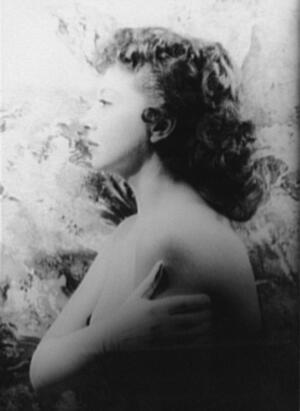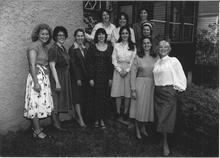Beverly Sills
Beverly Sills was a groundbreaking force as both a singer and as the first female director of the New York City Opera Company (NYCO). Singing on children’s radio shows as early as age four, Sills had memorized Italian arias by seven and entertained audiences in the Catskills at sixteen. In 1955, she joined the NYCO, and in 1975 she made her Metropolitan Opera debut. Following her retirement from singing, she became the director of the NYCO, eliminating the company’s massive deficit and making opera more accessible through various initiatives. In 1994, she became chair of the Lincoln Center board. The mother of two children with disabilities, Sills served as national chair of the March of Dimes and the Multiple Sclerosis Society, among other organizations.
A hero who succeeds against all odds is a perennial favorite of Americans. Opera singer and manager Beverly Sills fits this description. A precocious singer since the age of three, she did not debut at the Metropolitan Opera House until she was almost forty-six years old, way beyond her prime as an opera singer. Yet her career exemplifies a fighter who carved out her own niche in the opera world singing unusual repertory in less well known and less well-regarded houses before the official Metropolitan Opera world acknowledged her. Sills defied the odds and, as in the best of American traditions, she succeeded. Furthermore, she was a groundbreaker in her role as director of the New York City Opera Company (NYCO), a position neither a woman nor a singer had ever held before.
Early Life
Sills’s great ability and charming personality showed itself early in her life. Born Belle Miriam Silverman on May 25, 1929, in Brooklyn to Shirley (Bahn) and Morris Silverman, she displayed an interest in music as a baby. She listened to her mother’s old recordings of Amelita Galli-Curci, the legendary soprano, and by age seven had memorized twenty-two arias. Her Italian was mechanically produced, but her stage presence and bubbly demeanor won over her early audiences. A family friend named her Beverly Sills because she thought that it had better marquee value than Belle Silverman. Sills performed for family, friends, and whoever would listen. The actor and performer were already in evidence.
As a four- and five-year-old, she sang on the Uncle Bob’s Rainbow Hour radio show. The self-confident and articulate manner that would be so evident in the adult Beverly Sills was already manifesting itself in the child performer. At age seven, she became the student of Estelle Liebling, a noted and experienced singing teacher. Liebling remained Sills’s only teacher until Liebling’s death in 1970. From ages nine until twelve, under Liebling’s guidance, Sills was a regular performer on Major Bowes’ Amateur Hour. Every Sunday, she and her mother traveled from Brooklyn to Manhattan and the Capitol Theater Building to appear with Major Bowes. After three years, she retired to lead a more normal life in Brooklyn. However, the desire to perform remained an active ambition, though it was temporarily suppressed.
In Sills’s second autobiography, Beverly, she described her large, extended Jewish family, particularly her father’s side of the family. Morris Silverman had eight brothers and three sisters, while Shirley Silverman had one brother and four sisters. Sundays were often visiting days when the Silverman clan would gather. Beverly and her two older brothers, Stanley and Sydney, visited with their cousins, aunts, and uncles. In her neighborhood, called Sea Gate, Jewish families were in the majority and frequent socialization with family and neighbors was common. Sills easily acknowledges her Jewish heritage, though she had little formal Jewish education. When Sills’s father died in 1949 at the age of fifty-three, the connection with his side of the family weakened. By her account, neither the Silverman family nor the rabbi behaved in a comforting or supportive manner. Her mother turned to Christian Science for solace and saw no conflict between her Jewish heritage and her newfound philosophy.
Sills’s father played a dominant role in shaping her behavior. He wanted her to complete her education, including college, before she returned to a singing career. Sills was a very good student whose IQ was 155, and she displayed talent for mathematics as well as music, a not uncommon combination of skills. In 1942 she graduated from P.S. 91 in Brooklyn; then, while she continued her singing lessons in French and Italian, she attended Erasmus Hall High School in Brooklyn and the Professional Children’s School in Manhattan. By the time she was fifteen years old, she had mastered twenty operatic roles and, in her mind, had set her future course.
Young Adulthood and Early Singing Career
While her father wanted her to have a college education, Sills was determined to begin her professional singing career. She convinced her father to let her sing, and in the fall of 1945, at age sixteen, she went to work for the producer J. J. Shubert, touring with his Gilbert and Sullivan repertory company. In February 1947 she debuted in grand opera with the Philadelphia Civic Opera in the role of the Spanish gypsy Frasquita in Bizet’s Carmen. Although Sills had begun her singing career earlier than many other sopranos, she had little success breaking into a major company’s roster. By this time, she had more than fifty roles in her repertoire, but few opportunities to demonstrate her talent.
When her father died of lung cancer in 1949, she was both personally devastated by the loss and professionally frustrated at the lack of progress in her career. She continued searching for parts and often found herself touring in second-rate companies. In 1952, she spent the summer at the Concord Hotel in the Catskills, singing for an audience she called “appreciative Jews.” From 1952 to 1955, she auditioned for Joseph Rosenstock, the director of the NYCO, and finally, in 1955, he agreed to let her join the company. This association became a fortunate union for both Sills’s career and the company. The NYCO was considered to be the “second” opera house in the city and had neither the budget nor the prestige of the Metropolitan. However, Sills’s presence would change that situation. In October 1955, she debuted in Strauss’s Die Fledermaus, a role that displayed her charm, acting ability and virtuoso singing. Her skillful coloratura voice, which had been in training for so many years, was now public knowledge.
Family Life
While touring in Cleveland in 1956, she met the associate editor of the Cleveland Plain Dealer, Peter Greenough, and fell in love with him. The romance, courtship, and marriage, however, had many obstacles to overcome. Greenough was married at the time, a father of three daughters, Episcopalian, and thirteen years older than the twenty-six-year-old Sills. When Sills told her mother about Peter, Mrs. Silverman cried and wondered why her baby could not enjoy total happiness and success. Greenough courted Mrs. Silverman while wooing Beverly, and the couple was married on November 17, 1956. They established residence in Cleveland, and Sills commuted to New York to perform. The upper-class WASP society of Cleveland did not open its arms to Sills, a fact that astonished her. Her comfortable New York Jewish world had not prepared her for the sometimes overtly antisemitic world of Cleveland’s upper crust. Her father-in-law’s second wife was openly hostile to her, and Sills noted in her autobiography that she simply did not understand antisemitism, which judged people by predetermined labels, not as individuals. In 1959, the couple moved to Boston, where, in 1959, she gave birth to a daughter, Meredith (Muffy) Greenough. Some years later, they moved to New York City.
The Greenough’s learned that Muffy was deaf, a serious blow to an opera singer who had hoped to sing to her daughter. In 1961, Sills gave birth to a son, Peter Jr. (Bucky). Unfortunately, the child was developmentally disabled and required institutionalization. By her own admission, this was a very difficult period for Sills. She stopped singing professionally and concentrated on caring for her daughter. It was through the persistence of conductor Julius Rudel, her good friend, and colleague, that she was persuaded to resume her career in 1962. By 1965, Sills at thirty-six years of age had become the New York City Opera’s prima donna. The following year, when the company moved into its new house at Lincoln Center, Sills performed in what she later considered her finest role: Cleopatra in Handel’s Julius Caesar, with Norman Treigle as her costar.
Rise to Fame and Retirement
During the late 1960s, Sills gained fame and prominence in roles that had not been performed in many years. She was Pamira in Rossini’s The Siege of Corinth, Elvira in Bellini’s I Puritani, and the three queens in Donizetti’s Roberto Devereux, Maria Stuarda, and Anna Bolena. Sills’s superb acting skills and her sparkling personality were well illustrated in these unusual and difficult roles. Critic Winthrop Sargeant called her one of the wonders of New York. Sills later stated that her Queen Elizabeth in Roberto Devereux was her proudest achievement.
On April 8, 1975, at age forty-five, she debuted at the Metropolitan Opera Company as Pamira in The Siege of Corinth. The following year, she sang Lucia at the Met; in 1978, Thaïs. But Sills’s singing days were soon to be over. As she neared the age of fifty, she considered other career moves. Her long association with the NYCO remained an interest, and in 1979 she became the first woman and the first singer to manage that opera company. She thus joined a small group of women opera directors: Carol Fox at the Lyric Opera in Chicago and Sarah Caldwell in Boston. Sills announced her retirement from singing in 1979, and her farewell gala, on October 27, 1980, was televised on PBS. It was twenty-five years to the day since she had first sung with the NYCO. Two thousand fans came to Lincoln Center to pay her tribute, and the company raised one million dollars.
NYCO Directorship
During the next ten years, Beverly Sills ran the NYCO. When she began, the company had a five million dollar deficit. By 1987, she had eliminated the debt, demonstrating her awesome ability as a fund-raiser and public relations spokesperson for opera. Indeed, during the 1980s, thanks to her television appearances, Beverly Sills became a national spokesperson for the arts. She also displayed her easy laughter and charming nature on a special with Carol Burnett and in frequent appearances on The Tonight Show Starring Johnny Carson. Sills sang for President Ronald Reagan and became a frequently quoted celebrity on matters related to the arts.
Though she acquired critics as well as fans in her new role as manager, Sills was innovative in many areas. In 1983, she introduced supertitles in English, making opera more accessible to more people. She also introduced sign language. Part of Sills’s philosophy was to encourage American singers and to provide opportunities for American operas. In the mid-1950s she had sung in Douglas Moore’s The Ballad of Baby Doe, and in her tenure as director of the New York City Opera, she mounted productions of works by Stephen Sondheim, Dominick Argento, and Anthony Davis. Opera audiences saw, for the first time, an opera about Malcolm X (Davis’s X), as well as a modern treatment of Casanova (Argento’s Casanova). They heard new American singers such as Jerry Hadley, Samuel Ramey, and Carol Van Ness, all of whom went on to have major international careers. Sills’s leadership demonstrated to the opera world that American singers, trained in the United States, could make significant careers for themselves there without apprenticing in Europe, a new phenomenon.
In 1984, when Christopher Keene became the music director of the company, Sills concentrated on recruiting new singers and fund-raising. In 1989, she retired from her post but continued speaking and writing about the arts in America. In 1994, she became the chair of the Lincoln Center board, another first, since no woman or performer had ever before held this position. Sills said that she planned to develop more programs for teenagers so that the young could be introduced to opera, classical music, and theater. She held that post until 2002 when she became the volunteer chairwoman of the Metropolitan Opera. In January 2005 she resigned from this position, which she referred to as “the last act of a sixty-year career in the arts world.” She explained the move by citing both her own frailty (she had experienced three fractures in the course of a year) and the ill health of her husband, for whom she had been caring for eight years.
Legacy and Honors
Sills received many honors, including the Presidential Medal of Freedom (1980), the nation’s highest civilian honor, and the New York City Handel Medallion, for contributions to the city’s cultural life. She won a Grammy Award in 1976 and has won four Emmy awards (1975, 1977, 1980, 1981).
In 1987 Sills was one of four inductees into the Working Woman’s Hall of Fame, and in 1998 she was inducted into the National Women’s Hall of Fame. Sills sat on the President’s Task Force on the Arts, was a panelist of the National Endowment for the Arts, and was awarded fourteen honorary degrees.
Sills was involved with several charitable organizations, particularly those that reflected her experience as a mother of two children with disabilities. A former National Chairwoman of the March of Dimes Foundation—for which she helped raised more than eighty million dollars—she also served as chairwoman of the Multiple Sclerosis Society.
Beverly Sills’s contribution to the world of opera and the fine arts was impressive. Her groundbreaking role as an opera director as well as her career as a singer was notable. Her audio and video recordings, particularly from her 1950s performances in such delicate roles as Lucia, Manon, Thaïs, and the three Queens, will always preserve her legacy. Sills’s singing was known for its delicacy and fine interpretation. Her coloratura voice did not have the range or the endurance of lyric sopranos. It was only the early recordings that captured her voice’s beauty. Her video performances of La Traviata and Manon will ensure future generations the opportunity to see her effective acting technique. Her democratic interest in making opera available to large numbers of people reflected her egalitarian philosophy and her commitment to Americans of all ages, races, and backgrounds.
In her autobiographical discussions of her beliefs, Sills talked about her cultural connection to Judaism and America. While she viewed herself as a religious person, she did not practice any ritual (other than to light a memorial candle on the anniversaries of her parents’ deaths). She did not attend prayer services at a synagogue or temple and stated in her autobiography that her daughter, Muffy, could choose any religion she wished. In 1970 she visited Israel and was enormously impressed. She performed with Julius Rudel and the Israel Philharmonic Orchestra and found the experience to be exuberant, stimulating, and exciting. But her connection to Israel and Judaism, she wrote, was historical and temperamental, not philosophical or spiritual. She believed that one can believe in God and be religious without membership in a particular religion.
As a Jewish American, Sills shared the very American commitment to equal opportunity for all and to respect for and tolerance of religious and cultural differences. She enjoyed the diversity of peoples in the United States and considered the artistic freedoms and protections that America offers critical to creative success. As a self-confident woman, educated in both a Jewish and American environment that encouraged and rewarded achievement, Beverly Sills served as a role model for American women. As someone who overcame many obstacles in her career, she exemplified the enduring American image of the underdog succeeding against all odds. As an articulate advocate for the arts, Beverly Sills was among the most widely recognized faces from the world of American opera.
In 2002 Sills received the New York Heroes Award, the highest honor bestowed by the New York Chapter of the Recording Academy, given to individuals whose creative talents and accomplishments cross all musical boundaries. In 2005, The Metropolitan Opera established the $50,000 Beverly Sills Artist Award for aspiring American singers, and in 2006 she received New York University's Lewis Rudin Award for Exemplary Service to New York City. In 2007, she was inducted into the Long Island Music Hall of Fame.
Sills passed away on July 2, 2007, at the age of 78.
Current Biography. “Beverly Sills.” (1982): 392–396.
Davis, Peter G. “Devil’s Disciple.” New York 21 (October 8, 1988): 64ff..
Heymont, George. “Bravo NYCO!” Horizon 29 (April 1986): 33–34.
McNally, Terence. “Patience Is a Virtue.” Horizon 28 (July/August, 1985): 58.
Rich, Alan. “High Notes at the City Opera.” Newsweek 104 (October 8, 1984): 80ff..
Sills, Beverly. Bubbles: A Self Portrait (1976).
Idem. Beverly: An Autobiography, with Lawrence Linderman (1987).
Idem. “Make Ours a World of Love, Not Hate and War.” McCall’s 118 (May 1991): 68ff.
Wakin, Daniel. “Beverly Sills …” NYTimes, Jan. 26, 2005.






